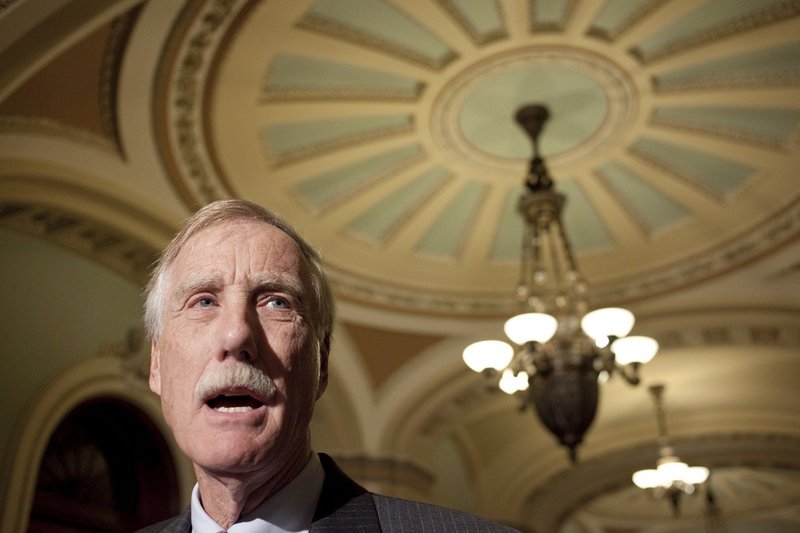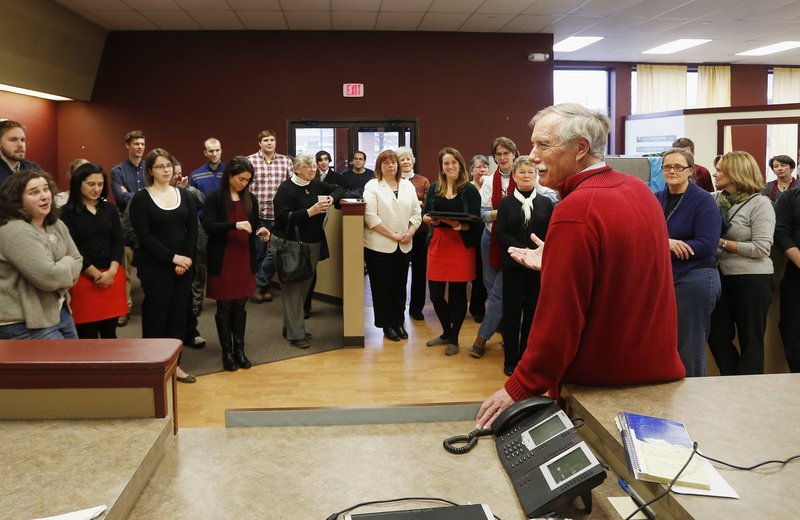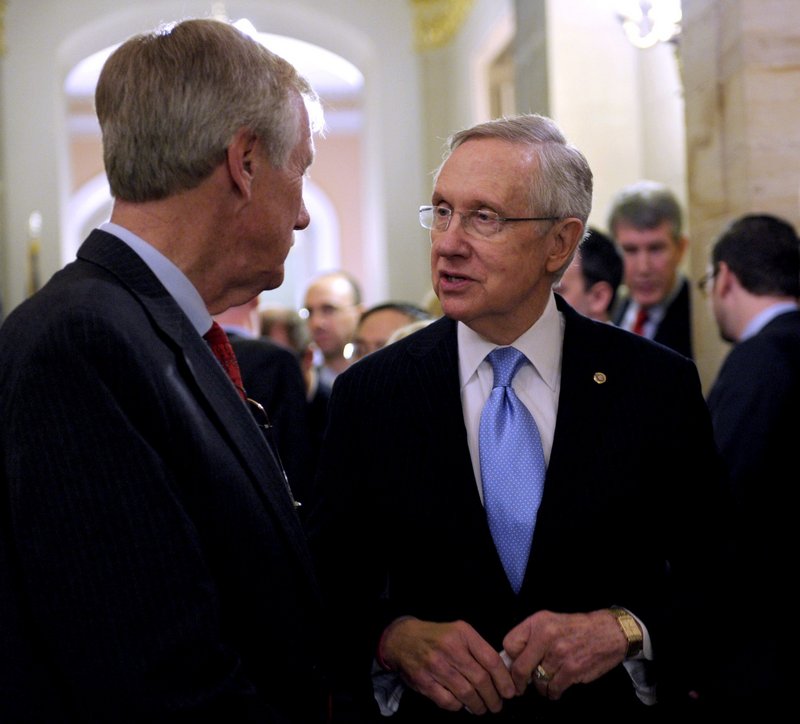BRUNSWICK – When Sen.-elect Angus King flew to Washington earlier this month, he took “Master of the Senate,” Robert Caro’s Pulitzer Prize-winning biography of Lyndon B. Johnson, in his carry-on luggage.
As the Eastern Seaboard scrolled beneath him, King re-read the first two chapters of the book, widely regarded as one of the most masterful sketches of the history of the U.S. Senate ever written. Caro describes how the aristocratic institution had, by the mid-20th century, atrophied into a reactionary and inflexible body incapable of leading itself but entirely effective at blocking anyone else’s initiatives.
Caro was setting the stage for LBJ’s arrival in the chamber in 1949, a freshman senator from a distant province who would successfully bend the most unbending of legislative bodies to his will. King, who will be sworn in on the Senate floor Friday, was looking for insights into an institution he hopes his presence can help change.
In a two-hour interview at his campaign headquarters in Brunswick, King, 68, shared some of his experiences in recent trips to Washington and his desire to reform filibuster rules, the banking sector, campaign finance and gun laws after he joins the Senate this week, a chamber he last served in 40 years ago as a junior aide to then-Sen. William Hathaway, D-Maine.
Having been warmly received by new colleagues from both parties, King says he is hopeful he can help serve as a bridge between them.
“The Senate was designed to slow things down,” King says, before reciting a story recounted in Caro’s book in which George Washington compared the Senate to a saucer in which to cool the passions pouring forth from the House of Representatives. “I heard that story five times when I was in Washington this month. But I also happened to be in the Senate gallery when Tom Udall, the senator from New Mexico, was speaking about it and said the purpose of the Senate is to cool things down but not to put it in a deep freeze.”
FIXING THE FILIBUSTER
Part of the problem, he says, is the filibuster, the technique by which 41 of the 100 senators can block most procedures, votes or bills. “Lyndon Johnson in six years (as Senate majority leader) faced one filibuster. Harry Reid in the last five or six has dealt with 386,” King says. “It’s become the norm that any piece of substantive legislation has to get 60 votes, and that’s not the way the Constitution was designed.”
The filibuster is a rule created by the Senate itself, not the framers of the Constitution, who in balancing the powers of government specified in various articles what proportions of votes were needed to pass laws or treaties or impeachments. It’s a graft that came later, he adds, and one that’s thrown off the balance, making it difficult for the government to take action on pressing issues.
That said, King isn’t advocating its repeal but rather wishes to scale back the situations and manner in which it is used. Senators should have to actually stand, speak, and hold the floor continuously to maintain the filibuster, as they once did, he said.
“If they have to stand there and read the New York phone directory, it will be much more apparent to the public who is doing the blocking and what lengths they are going to,” he says.
Senators should have an opportunity to filibuster a bill, he argued, but not the procedural motions to bring a bill to the floor or to send one that’s been passed to a conference committee to reconcile it with the House version.
“There’s an important constitutional role of the Senate to protect minority rights” from the Senate or House majority’s position, “but it’s all a question of degree,” King says. Our current Constitution grew out of frustration with the Articles of Confederation “because people realized somebody had to have the power to act. The danger of the abuse of the filibuster is that it moves us toward a government that can’t act, and we need to act. We’ve got all these problems.”
King has leverage on the issue, as he has a spot on the Rules Committee. He says he expects the Senate will act on the filibuster and, if it comes to it, he would vote to push through the necessary rules changes under a simple majority vote, an action consistent with the Constitution but one that has been called the “nuclear option” because rules changes have traditionally required a two-thirds majority. King says he believes a majority of his colleagues would back this approach if push came to shove.
GUNS AND MONEY
The Rules Committee also has jurisdiction over campaign finance laws. King favors passage of the DISCLOSE Act, which would increase campaign finance disclosure requirements in federal elections; that idea died in the Senate in 2010.
“I’m trying not to view this in terms of whether it will help the Democrats or hurt the Republicans or vice versa,” he says. “I’m trying to view this as how will this help the country.”
In the wake of the Newtown school massacre, King also supports gun control measures, though he notes the weaknesses in the now-expired 1994 assault weapons ban, which grandfathered millions of existing weapons and was easy for manufacturers to evade by modifying designs to fall outside the law’s language. Instead he says he’s focused on the size of ammunition magazines.
“I want to sit down with the gun people, particularly in Maine, and hear why we need a 100-bullet magazine or a 30-bullet magazine. When you’re hunting you get off one shot or two, not rapid fire,” he says. “I want to get away from the ideology of it and do something that works.”
He also said he disagrees with the argument that the solution to gun violence is arming more people.
Another issue likely to surface during his next term: ensuring the financial sector doesn’t undergo another meltdown of the sort that triggered the “great recession” in 2008. King, who until recently served on the board of the Bank of Maine, says his approach would emphasize structural rather than regulatory reforms.
His dream fix: restoring the Glass-Steagall Act, the 1933 law that prohibited commercial banks from acting as investment banks and vice versa. It was progressively watered down and effectively repealed in 1999.
“For 70 years, Glass-Steagall protected us from what just happened, where we had to bail out the commercial banks because they were a fundamental part of the financial system of the world,” he says. “Instead of approaching it from the point of view of regulation, it was a structural change, and you always do better if you can come up with structural solutions. Because no matter how you write regulations, people always find a way to get around them and distort things and have unintended consequences.”
As a case in point, King offers the Dodd-Frank Act of 2010, Congress’s primary response to the 2008 collapse to date. “Bangor Savings didn’t cause the collapse, but Bangor Savings and the Bank of Maine and Androscoggin Savings are just being hammered by these regulations, which I saw the effect of firsthand” while on the Bank of Maine board, he says. With all of the added reporting requirements, “one of the consequences is that you’re pushing these smaller institutions into the arms of the larger banks.”
“I’m a regulo-skeptic both from my own experience and from my experience as governor,” he adds. “One of the things I will pay attention to in Congress is if regulations are reasonable and are doing what they were intended to do.”
ON STAYING INDEPENDENT
King will caucus with the Democrats but said this had far more to do with their having retained the majority than with the more than $3 million that Republican groups spent against him in the campaign. (National Democrats largely sat the race out.) Not caucusing with either party wasn’t an option, as that would leave him out of the committee system where much of the Senate’s work takes place, depriving Maine of full representation and influence.
He said Democrats had assured him they would respect his independence and won’t attempt to punish him by taking away his committee assignments if he fails to vote with them. He said he was especially reassured after a conversation with former Senate Majority Leader George Mitchell, in which he asked how often the leader would demand a party-line vote. “George just laughed and said, ‘Well, I never could. You’re talking about Democrats!’ “
He also said he’s very pleased with his committee assignments. “For a guy with no party and no seniority, I feel pretty good about it,” he said.
In addition to Rules, King will serve on the Intelligence, Armed Services, and Budget committees. He said Armed Services was the only one he insisted on, as he’d learned that Sen. Susan Collins will leave that committee and both felt Maine needed representation to advocate on behalf of major military contractors such as the Portsmouth Naval Shipyard and Bath Iron Works.
Most encouraging, King said, have been the meetings he’s had with his Senate colleagues. After a weeklong trip to D.C. in mid-December, he said he had held substantive one-on-one meetings with 31 senators, including Republican leader Mitch McConnell and 10 of his colleagues. He was meeting many for the first time, but others were former governors he had worked with when he was in the Blaine House, including Tom Carper, D-Del., and Jeanne Shaheen, D-N.H.
At one point in his last visit, he received a phone call out of the blue from Carper just asking if he could be of help in any way. “It wasn’t setting up a meeting, it was pure: ‘Can I help?’ ” King recalls. “The senators we met were so gracious. I was treated so well by both parties, and I’m looking forward to the relationships.”
He and his wife, Mary Herman, also had lunch with Vice President Joe Biden at the White House. King recalls going through security and being escorted to a small West Wing waiting room. He was checking his email when “all of a sudden there’s this voice saying ‘King-Herman, table for four, King-Herman, table for four,’ and I look up at the door, and it’s Joe Biden,” King recalls. “We go in and have an hour-and-a-half lunch, just us with him at this little round table. That’s pretty cool.”
LIVING ON THE HILL
King and Herman have rented a one-bedroom walk-up on the third floor of a Capitol Hill row house a few blocks from the Senate chamber. When Congress is in session, most senators are in D.C. from Monday through Thursday and return home for the weekends.
This month the couple bought furniture for the apartment at a Washington-area IKEA store, where they were recognized by a sales associate, who turned out to be a retired employee of WABI-TV in Bangor. “He said, ‘I really like it that Maine’s new senator is shopping at IKEA,’ and I said, ‘No, I’m just looking for stuff I can afford,’ ” King says. “They have pretty nice stuff, but you have to put it together,” he added, showing a mark on his hand from the Allen wrench he’d used.
During a visit in November, King had occasion to walk out on the Senate floor unattended for the first time. “To walk through those doors and have it hit you that you’re entitled to be there is amazing,” he said. “It was particularly so in my case because I never expected to do it. It’s not like I was a congressman for 12 years and this was the next logical step. It came out of the blue.”
King decided to run for Senate in February, after Olympia Snowe’s surprise announcement that she was withdrawing her reelection bid. “My being there is one step removed from somebody dying and being appointed because it happened and was so unexpected,” he added. “I had no thought of doing it before then, and that, combined with having been a staffer 40 years ago, made it a genuinely emotional experience.”
“In terms of making a difference, it’s about as good as it gets,” he said after a pause. “The problems we face are really tough and complicated, but this is what I’ve been preparing for my whole life. I just didn’t know it.”
Staff Writer Colin Woodard can be contacted at 791- 6317 or at:
cwoodard@mainetoday.com
Send questions/comments to the editors.




